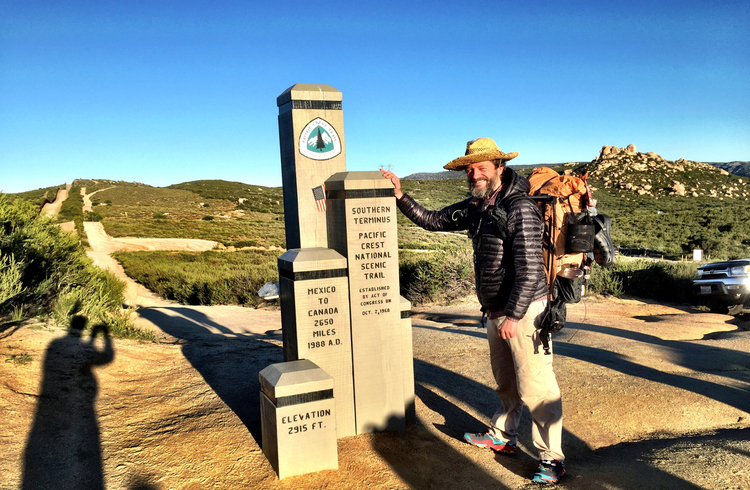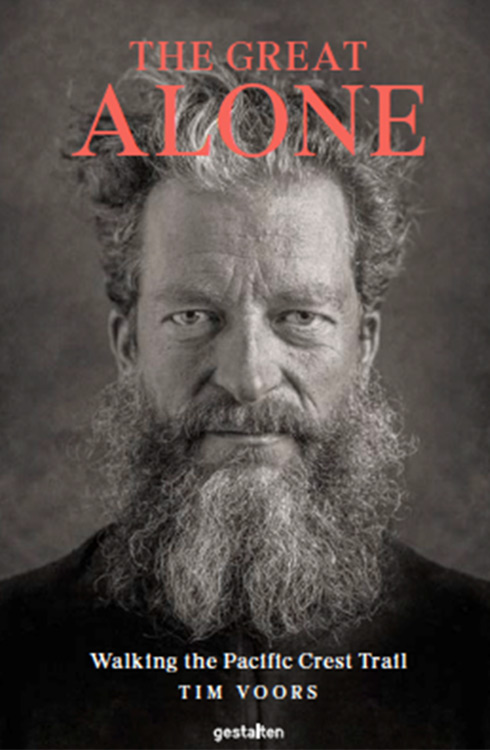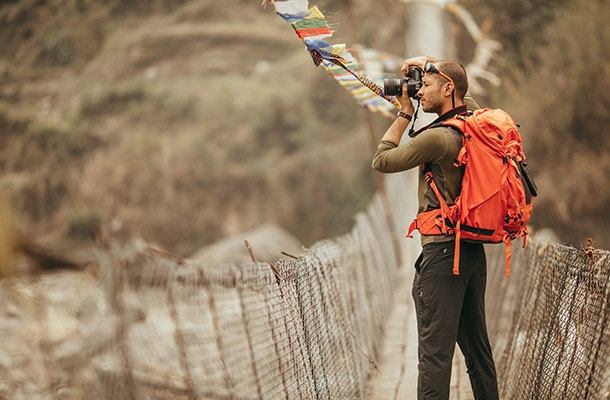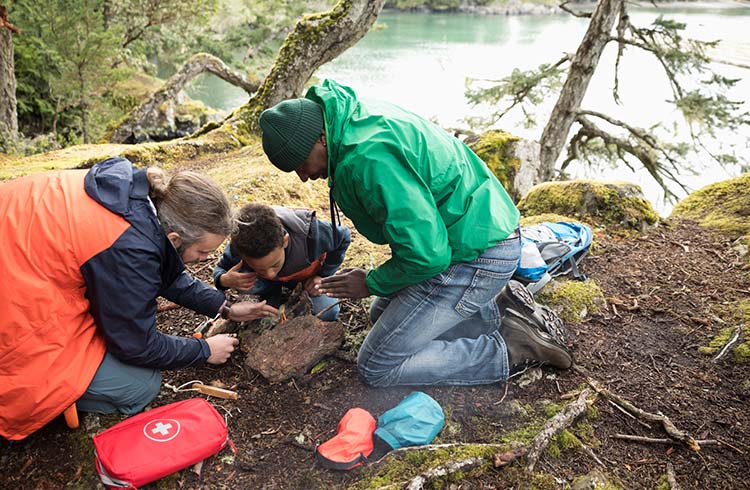Amazing Nomads: Tim Voors - Power of the Wilderness
In this episode, we meet Tim Voors who spent six months walking America’s Pacific Crest Trail overcoming loneliness and fear and discovering the power of the wilderness to restore the human spirit.
 Photo © Tim Voors
Photo © Tim Voors
Listen Now
Amazing Nomads: Tim Voors
Tim Voors is a passionate long-distance hiker who has hiked in numerous countries and continents including the Pacific Crest Trail in the US, which took him six months. To hear more about Tim’s trek, his encounter with a rattlesnake and why he had to use the SOS button on his sat-phone, listen now.
What’s in the episode
01:03 Kim's very good question
02:43 Tim's view on the term life changing
04:48 Going back to the family
07:18 Challenges of the hike
09:30 What Tim's wife doesn't enjoy
12:55 Sleeping under the stars
14:38 Encountering a rattlesnake
16:32 Don't rush
Quotes from the episode
“I sort of started doing my little trips. It started off to Africa for two weeks and then to Japan for two months, and then I kind of got out of control. I do admit that, walking six months across America.”
“You know, in our society, we generally do everything together as partners with your wife and your children. I also felt it was sort of good or healthy to not do everything together… so you can be who you are as an individual and grow.”
“The first seven weeks you're basically walking through a Western set. It's very desert. It's close to Mexico, obvious, obviously. So, you're walking through the mountainous desert, very rocky, dry with getting used to snakes for the first time in my life.”
Who is in the episode
Tim Voors has hiked the Camino de Santiago Francés in 1999, 2012, 2013 and the Camino del Norte in 2014. In 2013 and 2014 he, his wife and three children hiked sections of the Camino in the summer holidays. In 2015 Tim hiked the 88 Temples Trail, 1200 km around the Island Shikoku in Japan, and the Pacific Crest Trail in America in 2016.

Published by gestalten, “The Great Alone is as much about physical and mental endurance as it is about overcoming loneliness and fear. Ultimately, it’s about the power of the wilderness to restore the human spirit. Get ready for the sublime beauty of the Pacific Crest Trail from the Mojave desert, through the soaring peaks of the Sierra Nevada to Canada, traversing the American West. Lushly illustrated and featuring spectacular photography, the 2,650-mile (4,286-km) journey comes to life in The Great Alone.”
Trekking Photography: Gear & Packing Tips from the Pros
Our local photography expert Sunny Shrestha shares his tips on what to pack, and how to look after your gear.
Resources & links
Scholarships Newsletter: Sign up for scholarships news and see what opportunities are live here.
The Great Alone is also available as an audio book.
Follow Tim’s blog Random Trail Tales.
Want to republish this episode?
<iframe src="https://webplayer.whooshkaa.com/episode/423011?theme=light" height="190" width="100%" scrolling="no" frameborder="0" allow="autoplay"></iframe>
Next Episode: China
About World Nomads & the podcast
Explore your boundaries and discover your next adventure with The World Nomads Podcast. Hosted by Podcast Producer Kim Napier and World Nomads Phil Sylvester, each episode will take you around the world with insights into destinations from travelers and experts. They’ll share the latest in travel news, answer your travel questions and fill you in on what World Nomads is up to, including the latest scholarships and guides.
World Nomads is a fast-growing online travel company that provides inspiration, advice, safety tips and specialized travel insurance for independent, volunteer and student travelers traveling and studying most anywhere in the world. Our online global travel insurance covers travelers from more than 135 countries and allows you to buy and claim online, 24/7, even while already traveling.
The World Nomads Podcast is not your usual travel Podcast. It’s everything for the adventurous, independent traveler. Don’t miss out. Subscribe today.
You can get in touch with us by emailing podcast@worldnomads.com.
We use the Rodecaster Pro to record our episodes and interviews when in the studio, made possible with the kind support of Rode.
Speaker: The world nomads podcast bonus episode. Hear amazing nomads sharing their knowledge, stories, and experience of world travel.
Kim: Hi, it's Kim and Phil here with an Amazing Nomads episode featuring Tim Voors. Now just before we swing into that, make sure you join the World Nomads group on Facebook. There's insights into destinations from travelers and experts, and we'll fill you in on what Nomads is up to and who we're chatting with. Just like Tim.
Kim: Now he's a passionate, long-distance hiker. Now he's hiked in numerous countries and continents, including the Pacific crest trail in the US. Took him six months.
Phil: Oh, my word. Look, of course he wrote a book about it, and it's called the Great Alone, which is as much about physical and mental endurance as it is about overcoming loneliness and fear. Ultimately, Tim says it's about the power of the wilderness to restore the human spirit.
Kim: Well, I'm going to kick this chat off with a question, Phil, that is in no way judgmental, but Tim, you left your wife and your family to undertake this hike six months away. Why?
Tim: Very good question. Well, on the one hand, I still don't have the answer to that. And the other side, I kind of have a hundred answers. I think it's not one big reason. I think it's very much about also the, you know, in our society we generally do everything together as partners with the wife and your children. And I also felt it was sort of good or healthy to not do everything together. So I also stimulated my wife to spend about a month or more, two months a year walking to the Camino de Santiago, which you may know. And we'd done this together when we were, before we had children.
Tim: And so it's great to do stuff together as a family, but it's also, I think quite good and healthy to do stuff separately so you can be who you are as an individual and grow. And so this is kind of a process that we've sort of slowly walked down the past, I would say five years where my wife actually started the, these walks down to Santiago, and she's doing that every year.
Tim: And I sort of started doing my little trips. It started off to Africa for two weeks and then to Japan for two months, and then I kind of got out of control. I do admit that, walking six months across America.
Kim: Yeah, that's not a little trip, is it? So was it a life-changing hike for you?
Tim: I find life-changing a very big word, but I have to admit that my life did kind of shift after coming home after the six months. Yeah. I think just spending so much time out of the bubble that you know of work and family and friends, it just gives you time to reflect.
Tim: I wouldn't say it changed me like in one way very big, but it changed lots of little things in a very small way. And I guess if you add those, all those things up, it is quite a, has been quite a bit of a change.
Kim: So was there a shift in dynamic, and we'll get to the actual trek, but was there a shift in dynamic once you returned home to your wife and your children? Was there a settling period for you?
Tim: Oh definitely. I mean, I've probably like three years back, and I'm still in the process, or they are. And I think a lot of things change because we wanted to put Trex or Central into the whole life, if you will, from both me and my wife.
Tim: So we spend money very differently. Basically, we save a lot of money. So the way we as a family go about earning money and spending money has really changed. So obviously secondhand clothes didn't go down that well with the kids, but you know, they are getting into it.
Kim: So you made a conscious effort to look at the way you spend money so that you could use what you're saving to travel. Is this where we're going with this?
Tim: No, it's not so much that, but it's just so you, I work very hard, like we all do. But just to sort of change the dynamic of working and not working. I would say it's not just about travel, but it's just spending less money like I used to before buying stuff and everything. So just being on each level of how we spend money, being much more conscious so that you can maximize the time that you're not working.
Tim: But it's also funny that sometimes, obviously if you're gone as a dad for six months and you come back, and you sort of tell the kids what to do, they sort of give you this big long death stare and say, "Excuse me?"
Tim: And, I say to my wife, "Who's this hobo who, this homeless guy sitting at the table, you know?" So they do make a lot of jokes and I think it's very, yeah, it's humbling also, you know, the sort of, I think also the role that I played before as a father and after is very different in that, in the way I sort of interact with my children.
Kim: Well, let's get to the hike then. It was across America on the Pacific Crest trails. So what made you decide on that one in particular?
Tim: I had heard about it for quite some years, I think from a magazine that I'd read, and I'd seen pictures and when people were doing it, perhaps in the late '70s, '80s, and very few people, perhaps only 10 people did it every year.
Tim: And now it was one of those sort of, when you read a book about Everest, you're like, "Oh, that's great." But you know, you're never going to do it. But as I sort of progressed in doing these long treks, I walked all the way across Japan.
Tim: And when I'd finished that I felt I was still terrified of the idea, but I felt I was finally perhaps ready to prepare myself mentally and physically and buy new gear. And once I'd sort of then just started discussing it with my wife and my children and started saving money for about two years because the trek itself isn't actually that it's expensive, it's more actually the family at home that in my case wasn't earning that much money while I was gone.
Tim: So I had to really save for the... To make sure there was enough money for the family to go around. Yeah. So then I felt I was ready, and like I said, I was still very scared how on earth I was going to find enough water in the desert, and I had no idea how to do this whole resupply thing with food as you only, yeah, you only go through a town perhaps every four to seven days. So I had no idea how that would work. So there was lots of sort of insecurities that I had sort of to fix in the year prior to the hike.
Kim: Well, you've documented it in a book called the Great Alone, and you do say that it's certainly not for the fainthearted, this hike. What challenges did you experience along the way?
Tim: So not for the fainthearted. Yeah, I mean, I guess the biggest thing is that you don't really know what's going to happen around the corner, and there's the trail and the weather and the elements just throw so many curve balls at you. So much unexpected things that I guess that's the sort of, you've got. Yeah.
Tim: You think you're sort of know how it all works and then suddenly a thunderstorm breaks out, or you think you've sort of got everything settled, and you get a small foot injury. Or it's all these little things that actually are quite big things out there because your work, you're hiking about a marathon a day, and yeah, your body has to be up to par, and it's very different than hiking in most other places in the world. Because you just never see any human-built structures or civilization.
Tim: So if something goes wrong, it's about a three- to four-day hike to civilization to get some help. So it's, you kind of feel that the whole time you're the... How small and vulnerable you are.
Kim: So among those 20 things that you carried on your back, was there a satellite phone? I mean, you went through bear country. What if you were injured? How would you possibly hike three days for help with whether the injury from a bear as an example?
Tim: Yeah. Good. Good question. I think, I mean, I was a father and obviously had a responsibility at home, and I could also financially afford it. So I did buy a, let's say a sat nav sort of tracking device. So it wasn't a satellite telephone, but it did have a like an SOS button on it and it, and I could send two-way messages to my wife so that I could sort of basically, if someone perhaps died on, here in Holland, in my family, like an older person that I could be connected and that I could hurry home or the other way round, I guess, if I would slide down the mountain and I could press on the button for help.
Tim: So I didn't, I definitely did, you know, check all my insurances. And it's funny, my wife doesn't fly at all, so she said, "If you slide off the mountain, you go in coma, I'm not going to go over to the States and sit at your bed." So I had to do another insurance, which is like a hospital plane.
Kim: Yeah.
Tim: It wasn't actually that expensive, but that would fly me back to Holland should I come in some serious situation. So I definitely had all my sort of "what if" scenarios covered. But in, in reality I didn't actually use the device more than three times just to send, actually to ask my wife if what had happened with Brexit vote.
Kim: So you had a lot on your mind then when you were hiking? That's very funny.
Tim: Yeah. It was funny. I was actually hiking with an Englishman, just then in the High Sierras, and it was... We had about 11 days without cell coverage in the most beautiful American mountains you can imagine.
Tim: But we were talking about this Brexit, and he was actually a very for, pro-Brexit and I was against it. And so we were having these long sort of yeah, philosophical conversations that high in the mountain. But it was kind of interesting to know who had won.
Kim: And so tell me, why doesn't your wife fly then?
Tim: I guess she's scared of flying. And she just doesn't feel she needs it in her life. Europe's pretty beautiful, and she's like, "I'm fine without flying."
Kim: Yet you say in your book, "The world is waiting."
Tim: It is, but I guess this is for everyone on their own terms. Right? The world can be the next city. Generally, if you make it a bit of an effort within about an hour or two, anyone in the world can be in nature. So I think that's kind of what I mean by the world is waiting there. There are just so many exciting new things to see. We generally just stay in our well-known patterns. That's I guess what I'm trying to say.
Kim: These Pacific Crest trail I'm meandering through soaring peaks of the Sierra Nevada to Canada and then the American West with mountain lakes and nights under the stars. This is all how it's described in your book. Tell us about it.
Tim: Well, as I said, coming from a very flat country where I live, I actually lived three meters under sea level. It was very difficult to sort of imagine what this wild, rugged land of America would be. And I think the best way to describe it is that it's just very diverse, changing when you least expect it.
Tim: But the first seven weeks you're basically walking through a Western set. It's very desert. It's close to Mexico, obvious, obviously. So you're walking through the mountainous desert, very rocky, dry with getting used to snakes for the first time in my life.
Tim: And really being very conscious about the water. Obviously the water sources being very far apart in the desert. So you're really carrying sometimes up to eight liters of water and being very aware of the fact that you just don't want to be out of water.
Tim: So that was, but also it was just this wide-open country, no trees. And I just loved that you could, you would always have beautiful sunsets, and I would rarely set up my tent and just sleep under the stars and then going up into the Sierra mountains. It's more like the Alps and snow-capped mountains. Very sharp and rugged. A lot more work, if you will, to zigzag up and over all the passes. But then obviously there's lots more water, so you're not carrying so much water. You can swim in the beautiful icy lakes.
Tim: And I mean it's very serious country, so you don't want to slip and fall. But it is just stunningly beautiful and it's, you know, here in Europe we have the beautiful Alps, but they're full of ski lifts and beautiful old ancient villages. And out there in America is just empty nothingness. It's just amazing.
Tim: And then up on over the North, California is a bit more, the Americans would call a bit more boring, but personally I loved it. It was just beautiful. Unfortunately, you walk through a lot of dead burnt forests. And then I've been to Oregon, which is sort of like Lord of the Rings country with beautiful sort of sleeping volcanoes and then up into the Washington, which just is even more beautiful with these mossy forests and the snow-capped volcanoes, and it just... It's amazing, America. Just goes on and on and on, and it's empty. And sure there are a lot of other hikers, but out on the trail you generally sort of spread out and you don't, you can just be walking for hours and hours and not see anyone else.
Kim: How nice. Look, you spoke of snakes, and we mentioned earlier bear territory. Did you have any encounters with the wildlife?
Tim: Yeah, sure. I mean, I think it was already within about three days that I saw my first snake, a rattlesnake. Yeah, especially the sound obviously, is, I mean, it scares the shit out of you, and you really have to sort of think of how to best approach them because especially if they're lying curled up on the trail.
Tim: But I did notice that because you saw them basically every day, you really do get used to it, and if you sort of handled them with respect and obviously they have a lot of space out there in nature, they're not really looking to annoy or attack you.
Tim: With bears, obviously it's a little bit different, but they have black bears in this part of the country. So bears were more interested in your food than in actually in you yourself.
Tim: So if we did see a bear, they generally just ran off really fast. You had to grab your camera if you could try and get a picture in time.
Tim: Yeah, I mean, you saw a lot of deer, so I think in general they were not very many scary animal wildlife encounters. Obviously that can happen, and you can get pretty freaked out. So you'd have to be, you know, just use your common sense really.
Kim: Now you said at the start of the podcast pretty much that you had to do a lot of research before, and it took a long time before you hit it off on this hike. But fortunately for others in the Great Alone: Walking the Pacific Crest Trail, you've pretty much done the work for everyone is the obvious story of what you did. But also the details of hiking etiquette to planning your food, resupply boxes, and navigating some of that fear territory that we spoke about.
Kim: What would you say to anyone thinking of spending that much time away from the real world?
Tim: The most important thing is not to postpone too long. Give yourself a bit more than a year to prepare both mentally and financially and deer, and feces and all those kinds of things. And it's going to terrify you just as much as it did me. But generally if you just take it step by step and don't rush, things generally will work out.
Kim: We will have a link to the book in show notes, along with an article on what you are and aren't covered for when hiking or trekking. So thanks for that, Tim.
Phil: It's beautifully illustrated, isn't it? That book? And look, we're also pretty lucky that Tim has shared some of the photos, which we'll stick in show notes as well. Six months. That's because the Pacific Crest Trail is 2,650 miles long. That's like 4,200 kilometers. That's a long walk.
Kim: It is a long walk, isn't it? I may be sometime. Next week, China. And speaking of photos, we chat to one of the first Westerners allowed to take pics in the countries.
Phil: See ya.




No Comments